The Guns at Last Light: The War in Western Europe, 1944 – 1945 (Liberation Trilogy) by Rick Atkinson (Henry Holt)
Final Volume Completes Liberation Trilogy
With The Guns at Last Light, Rick Atkinson concludes his three-volume Liberation Trilogy, a magisterial epic of the U.S Army in the European Theater of World War II. The trilogy opened with the Pulitzer-winning An Army at Dawn in 2002, which described the conflict in North Africa, and then continued with The Day of Battle in 2007, which covers the war in Sicily and Italy. In this volume, Atkinson follows the Allied Armies from the bloody D-Day beaches of Normandy in June of 1944 all the way to the haunting sound of buglers playing taps on V-E Day nearly a full year later.

The entire work is a triumph, and, as each of the volumes builds on the ones preceding, it is in The Guns at Last Light that Atkinson reaches his highest points, and they are ones that few histories or historians ever achieve. Atkinson’s Liberation Trilogy deserves to be classed with Shelby Foote’s monumental masterpiece, The Civil War, and represents the best and most ambitious history written in this generation. The following short paragraph about the evening before D-Day conveys some of Atkinson’s extraordinary gift for narrative:
Red and green navigation lights twinkled across the downs as the sun set at 10:06 p.m. Singing voices drifted in the gloaming—“Give me some men who are stout- hearted men / Who will fight for the right they adore”—punctuated by a guttural roar from paratroopers holding their knives aloft in homicidal resolve. Into the airplane bays they heaved themselves, with a helpful shove from behind. Many knelt on the floor to rest their cumbersome gear and chutes on a seat, faces bathed by the soft glow of cigarette embers and red cabin lights. “Give me guts,” one trooper prayed. “Give me guts.” Engines coughed and caught, the feathered propellers popping as crew chiefs slammed the doors. . . .From the west the last gleam of a dying day glinted off the aluminum fuselages. “Stay, light,” a young soldier murmured, “stay on forever, and we’ll never get to Normandy.”
Like each of the preceding Liberation volumes, The Guns at Last Light is self-contained, and can be read with pleasure on its own. Atkinson is a masterful story teller, with a novelist’s—indeed a poet’s—eye for detail. Although the book is 850 pages long, its narrative thrust never flags. Atkinson follows the Army through France, Belgium, and Germany, along paths both well worn by historians, such as Omaha Beach, Arnhem and Bastogne, and less traveled, such as the Scheldt Estuary, Hammelburg and the Ludendorff Bridge. His message echoes William Tecumseh Sherman’s observation that “war is cruelty, you can’t refine it.” His method is democratic in sprit, as every engagement matters keenly to the soldiers involved. Atkinson knows well that the Army combat soldier saw only what was on his front. He quotes one soldier’s letter home in which he describes the isolation of the combatant’s perspective with this chilling remark: “sometimes, our eyes are the only thing alive.”
Atkinson’s account is not a mere battle briefing—weightier matters are at stake. He leaves no doubt that this war was fought for a purpose, and from the German perspective, a frightening one. As Atkinson tells it, Hitler and the Axis Powers sought nothing less than the extermination of democracy and liberty from the face of the earth, a goal they pursued every bit as surely as they sought the extermination of individual creeds, races, and nations. In these pages, you will meet the American Soldier, often badly served by incompetent Generals and frequently under-supplied with malfunctioning or improper equipment, but always game for battle. As WW II wore on, it was this American Soldier who increasingly carried the brunt of the fighting on the Western Front, and who did much of the dying. It was thus largely the American Soldier who liberated Europe from the Axis Powers, and then held those lands free from another, looming threat to the East. Freedom and liberty, Atkinson teaches us, may come at a price, but they are worth defending. The US Army paid that price in WW II and we are still defending those freedoms and that liberty today.



